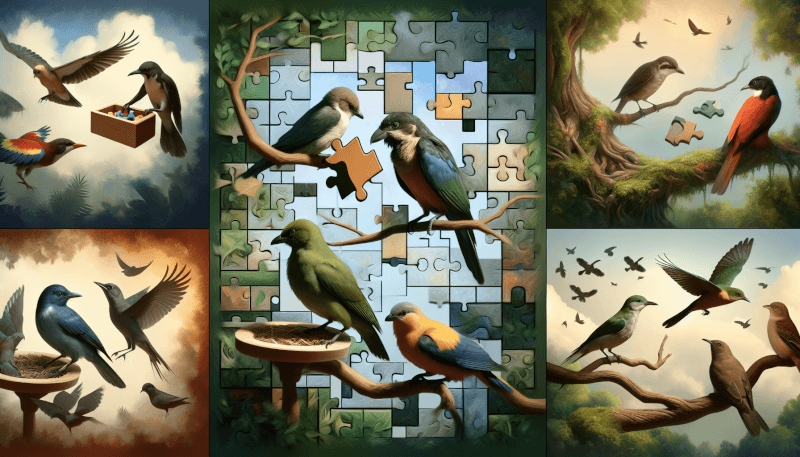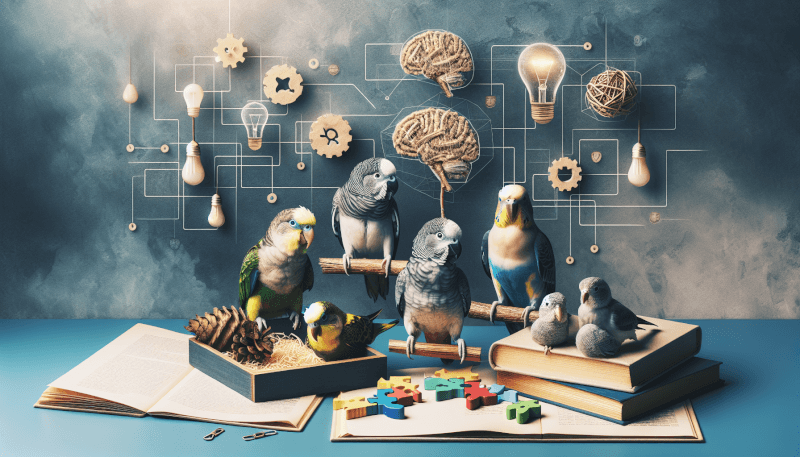When it comes to helping our feathered friends, promoting avian cognition is key. Birds are highly intelligent creatures, capable of problem-solving, learning, and even emotional connections. In this article, discover the top tips for enhancing cognitive abilities in birds, from providing stimulating environments to engaging in interactive play. Whether you’re a bird enthusiast or simply want to make a greater impact on our avian friends, these tips will surely keep our feathered companions curious and content.

Creating a Stimulating Environment
Provide Enrichment Activities
To promote avian cognition, it is essential to provide your feathered friend with plenty of enrichment activities. These activities keep them mentally engaged, preventing boredom and promoting overall well-being. Consider providing puzzle toys, foraging toys, and interactive games that allow your bird to explore and problem-solve. These activities not only stimulate their cognitive abilities but also provide them with the opportunity to exhibit natural behaviors.
Offer a Variety of Foraging Opportunities
Foraging is an essential behavior for birds in the wild, and providing opportunities for foraging in captivity can greatly enhance their cognitive skills. Scatter food in various locations within their aviary or use foraging toys that require them to manipulate objects or solve puzzles to access food. By engaging in this natural behavior, your bird will be mentally stimulated as they search for their food, mimicking the challenges they would face in the wild.
Include Natural Elements in the Aviary
Incorporating natural elements into your bird’s environment can enhance their cognitive abilities and promote a more stimulating experience. By adding branches, perches, and natural climbing structures, you create an environment that encourages exploration and physical activity. You can also introduce live plants or arrange toys and perches to mimic the natural setting, providing your bird with additional mental and sensory stimulation.
Rotate Toys and Perches Regularly
To prevent monotony and maintain a stimulating environment, it is important to regularly rotate your bird’s toys and perches. This simple action prevents your bird from becoming accustomed to their surroundings and keeps them engaged. Introduce new toys with different shapes, textures, and colors to provide novel stimuli. Similarly, changing the arrangement of perches and toys within the aviary can create a more dynamic environment, challenging your bird mentally and physically.
Optimizing Diet and Nutrition
Provide a Balanced Diet
Ensuring your bird receives a balanced diet is crucial for their overall health and cognitive function. A well-balanced diet consists of a variety of fruits, vegetables, grains, and a high-quality commercial bird food. Different foods provide various essential nutrients necessary for optimal brain health and cognitive abilities. Consult with a veterinarian or avian nutritionist to determine the appropriate diet for your specific bird species.
Include Nutrient-Rich Foods
In addition to a balanced diet, incorporating nutrient-rich foods can further support your bird’s cognitive abilities. Foods like dark leafy greens, berries, seeds, and nuts contain antioxidants and essential fatty acids that nourish the brain and promote cognitive function. Remember to introduce new foods slowly, as some birds may be hesitant to try new flavors and textures. Offering a diverse range of nutrient-rich foods will not only improve their mental abilities but also contribute to their overall well-being.
Offer Food Puzzles and Problem-Solving Challenges
Food puzzles and problem-solving challenges provide mental stimulation while also satisfying your bird’s natural foraging instincts. These activities require your bird to solve puzzles or manipulate objects to access their food. You can create simple puzzles by placing treats inside cardboard tubes or hiding food within a series of cups. These puzzles engage your bird’s problem-solving skills and encourage them to think critically, enhancing their cognitive abilities.
Consider Supplements or Fortified Feeds
In some cases, supplements or fortified feeds may be beneficial for supporting avian cognition. Talk to your avian veterinarian to discuss whether your bird would benefit from specific supplements or fortified feeds. Omega-3 fatty acids, vitamins, and minerals are among the additives that can enhance brain health and cognitive abilities in birds. However, it’s important to remember that supplements should only be used under the guidance of a veterinarian or avian nutritionist to ensure the appropriate dosage and administration.

Training and Interactive Play
Use Positive Reinforcement Techniques
Training your bird using positive reinforcement techniques is an excellent way to stimulate their cognitive abilities while strengthening your bond. Reward-based training encourages your bird to think and problem-solve, as they associate certain behaviors with positive outcomes. Use treats, praise, or favorite toys as rewards when your bird successfully performs a desired behavior. This positive reinforcement not only promotes cognitive stimulation but also creates a positive and trusting relationship between you and your bird.
Teach Basic Commands and Tricks
Teaching your bird basic commands and tricks is not only entertaining but also beneficial for their cognitive development. Start with simple commands like “step up” or “wave” and gradually introduce more complex tricks. This process engages your bird’s ability to learn and understand verbal cues, improving their cognitive abilities. Be patient, use positive reinforcement, and keep training sessions short and fun to prevent your bird from becoming overwhelmed or losing interest.
Engage in Interactive Play Sessions
Interactive play sessions provide mental and physical stimulation for your bird. Spend time playing with your bird using toys that encourage interactive play, such as puzzle toys or toys that require them to manipulate objects. Engaging in play sessions allows your bird to exercise their problem-solving skills and reinforces the bond between you and your feathered friend. Remember to choose toys that are safe and appropriate for your bird’s size and species.
Encourage Independent Problem-Solving
While it’s important to provide interactive play sessions, it’s equally important to encourage your bird to engage in independent problem-solving activities. This allows them to stimulate their cognitive abilities and adapt to challenges on their own. Provide toys that require your bird to manipulate objects, solve puzzles, or figure out how to access treats. Encouraging independent problem-solving not only promotes cognitive growth but also fosters a sense of confidence and autonomy in your bird.
Socialization and Behavioral Enrichment
Promote Social Interactions
Social interactions are vital for avian cognition and overall well-being. Provide opportunities for your bird to interact with you, other family members, and fellow avian companions. Regularly engaging in social interactions helps stimulate their cognitive abilities, as they learn to communicate, imitate, and respond to different individuals. Ensure that interactions are positive and enriching, and always consider your bird’s preferences and comfort level when introducing new social interactions.
Expose Birds to Different Humans and Animals
Exposing your bird to different humans and animals can broaden their experiences and enhance their social and cognitive skills. Arrange supervised interactions with trusted friends, family members, or other pet birds to stimulate your bird’s social cognition. Exposing them to various individuals encourages adaptability, communication, and problem-solving. Ensure that all interactions are safe, stress-free, and positive for your bird’s overall well-being.
Provide Opportunities for Flight and Exercise
Allowing your bird to engage in natural behaviors like flying and exercising is essential for their cognitive development. Provide ample space and opportunities for your bird to flap their wings and explore their environment. This not only stimulates their cognitive abilities but also promotes physical health and muscular development. Setting up bird-safe play areas or flight rooms can provide your bird with the freedom to exercise and explore, enhancing their overall well-being.
Address Common Behavioral Issues
Addressing common behavioral issues is crucial for promoting avian cognition. If your bird is displaying any behavioral problems such as excessive screaming, feather plucking, or aggression, consult with an avian behaviorist or veterinarian to address the underlying causes. By addressing these issues, you can promote a more positive and stimulating environment for your bird, allowing them to focus on cognitive growth and learning.

Environmental Enrichment Techniques
Use Sound and Visual Stimuli
Sound and visual stimuli can provide continuous engagement and mental stimulation for your bird. Play calming nature sounds or classical music to create a soothing environment, or provide a variety of toys that produce different sounds. Visual stimuli such as colorful mobiles or videos designed specifically for bird viewing can also captivate their attention and promote cognitive growth.
Set Up Bird-Proof Mirrors
Bird-proof mirrors can offer entertainment and social interaction for your bird. Place a mirror within their aviary, ensuring that it is safe and made specifically for birds. The reflection in the mirror can mimic the presence of another bird, stimulating social behaviors and cognitive development. However, it is important to monitor your bird’s interactions with the mirror to ensure they do not become overly fixated or territorial.
Introduce New Scents and Materials
Introducing new scents and materials into your bird’s environment can stimulate their sense of smell and provide mental enrichment. Offer fresh herbs, flowers, or even bird-safe branches with different scents. Additionally, providing different materials like seagrass, cotton, or natural fibers to incorporate into their nest-building activities can promote cognitive growth and encourage exploration.
Create Safe Outdoor Spaces for Exploration
If weather and safety conditions permit, creating safe outdoor spaces for exploration can greatly enrich your bird’s environment. Outdoor aviaries or supervised play areas allow your bird to experience different sights, sounds, and natural elements. Exposure to the outdoors stimulates their cognitive abilities and provides a change of scenery, encouraging mental and physical exercise.
Strengthening Cognitive Skills
Implement Puzzle Toys and Games
Puzzle toys and games specifically designed for birds offer mental stimulation and cognitive development. These toys require your bird to manipulate objects or solve puzzles to retrieve treats or rewards. Choose puzzles that are appropriate for your bird’s size and species, ensuring they are challenging but not frustrating. By engaging in puzzle-solving activities, your bird can enhance their problem-solving abilities, memory, and focus.
Teach Discrimination and Memory Tasks
Teaching your bird to discriminate between objects or remember specific cues is an effective way to strengthen their cognitive skills. Start by introducing two different objects and rewarding your bird for associating a specific behavior with one of the objects. Gradually increase the complexity by adding more objects or introducing different cues to be remembered. This type of training challenges their cognitive abilities and improves their discrimination and memory skills.
Practice Problem-Solving Activities
Engaging your bird in problem-solving activities is an effective way to stimulate their cognitive abilities. Present your bird with puzzles or challenges that require them to find a solution. For example, hide treats in different locations or provide toys that require manipulation to access rewards. These activities encourage your bird to think critically, becoming more skilled at problem-solving and adaptive behaviors.
Utilize Training for Cognitive Stimulation
Training sessions not only strengthen the bond between you and your bird but also provide cognitive stimulation. Teaching your bird new tricks and commands requires them to think, understand cues, and execute appropriate actions. Break down complex behaviors into smaller achievable steps, using positive reinforcement to reward their progress. By engaging in training sessions, your bird will develop important cognitive skills, such as attention, memory, and problem-solving abilities.

Promoting Natural Behaviors
Encourage Nesting and Breeding Behaviors
Encouraging nesting and breeding behaviors in your bird provides them with the opportunity to engage in natural activities that stimulate their cognitive abilities. Offer appropriate nesting materials, such as shredded paper or natural fibers, and create a safe and comfortable nesting area within their aviary. Observing and participating in nesting and breeding behaviors allows your bird to exhibit their natural instincts, promoting overall cognitive growth.
Provide Materials for Nest Building
Provisioning nest-building materials like twigs, straw, or leaves encourages your bird to engage in complex behaviors, fostering problem-solving and cognitive development. Offer these materials within their aviary, allowing them to construct their nests. Providing nesting materials motivates your bird to exhibit natural behaviors, stimulates their cognitive abilities, and enhances their overall well-being.
Support Prey Capture and Foraging Instincts
Birds have innate prey capture and foraging instincts, and catering to these instincts can greatly enhance their cognitive abilities. Offer toys or activities that mimic hunting and foraging experiences, such as hiding food in various locations or providing toys that require them to manipulate objects to access treats. By engaging in these natural behaviors, your bird will exercise their cognitive skills and enjoy a more fulfilling and stimulating life.
Enable Bathing and Grooming Opportunities
Bathing and grooming are essential natural behaviors for birds, and providing opportunities for your bird to engage in these activities promotes cognitive growth. Place a shallow dish of water or provide a misting device for your bird to bathe in. Additionally, offer bird-friendly grooming perches with different textures to encourage self-grooming. These activities not only stimulate your bird’s sensory and cognitive abilities but also contribute to their overall health and well-being.
Enhancing Perceptual Abilities
Expose Birds to Vibrant Colors
Introducing vibrant colors into your bird’s environment can enhance their perceptual abilities and cognitive development. Choose toys and objects with different colors and place them strategically within their aviary. This visual stimulation allows your bird to engage their perceptive senses, improving their ability to discriminate between colors and enhancing their cognitive skills.
Integrate Different Textures and Surfaces
Offering a variety of textures and surfaces for your bird to explore promotes cognitive and sensory development. Provide perches made of different materials, such as wood, rope, or natural fibers, to stimulate their sense of touch. Introduce toys with different textures, like soft fabric, smooth plastic, or rough wood, to encourage tactile exploration. By integrating diverse textures and surfaces, you provide a multisensory experience that enhances your bird’s cognitive abilities.
Utilize Target Training and Discrimination Tasks
Target training and discrimination tasks are effective ways to promote perceptual abilities in birds. Teach your bird to target an object, such as a small stick or a specific color, by associating it with a reward. As they progress, gradually introduce discrimination tasks, where they must distinguish between different objects or colors. These activities enhance their ability to perceive and discriminate visual stimuli, strengthening their cognitive skills.
Encourage Eye-Beak Coordination
Birds rely on their beaks and eyes to perform various tasks, and by encouraging eye-beak coordination, you can enhance their cognitive abilities. Provide toys or activities that require your bird to pick up or manipulate objects using their beak and eyes. For example, offer a foraging toy that requires them to remove food from crevices or use their beak to manipulate puzzle pieces. These activities stimulate eye-beak coordination, improving their fine motor skills and cognitive development.

Utilizing Positive Social Interactions
Encourage Playfulness with Human Companions
Encouraging playfulness with human companions can enhance your bird’s social and cognitive development. Engage in interactive play sessions that involve toys, games, and positive interactions. Gently toss or roll balls for your bird to chase, or provide toys that they can manipulate together with you. These activities promote bonding, trust, and cognitive growth, as they require your bird to focus, problem-solve, and communicate with you.
Provide Opportunities for Group Activities
If you have multiple birds, providing opportunities for group activities can greatly enrich their social and cognitive development. Offer toys and games that can be enjoyed by multiple birds simultaneously, encouraging cooperation, playfulness, and problem-solving among them. Structured activities, such as group foraging or training sessions, promote social interactions and cognitive growth as the birds learn from and adapt to one another.
Promote Positive Interaction with Other Avian Species
Promoting positive interaction with other avian species encourages cognitive growth and social development. Arrange supervised meetings between your bird and other bird species, ensuring safety and compatibility. Interaction with other birds stimulates communication, learning, and problem-solving abilities. When introducing your bird to new avian companions, observe their behavior and intervene if any signs of aggression or distress arise.
Foster Bonding and Affectionate Behaviors
Positive social interactions and affectionate behaviors are essential for your bird’s cognitive and emotional well-being. Spend quality time with your bird, engaging in gentle head scratches, soft talking, or grooming sessions. Offer opportunities for physical contact, such as allowing your bird to perch on your hand or shoulder. These actions foster bonding and trust, promoting overall cognitive development and a happier, more fulfilled bird.
Monitoring and Assessing Cognitive Abilities
Conduct Regular Behavioral Observations
Conducting regular behavioral observations of your bird allows you to monitor their cognitive abilities and overall well-being. Pay attention to changes in behaviors, such as problem-solving skills, memory, attention, and social interactions. Document any significant changes and consult with an avian veterinarian or behaviorist if you notice any concerning patterns or behaviors.
Participate in Citizen Science Projects
Participating in citizen science projects focused on avian cognition can contribute to the scientific understanding of bird intelligence while providing mental stimulation for your bird. These projects involve engaging your bird in various cognitive tasks or behavioral studies and sharing the results with researchers. By participating, you contribute to ongoing research efforts and gain insights into your bird’s cognitive abilities.
Work with Avian Cognition Researchers
Collaborating with avian cognition researchers is an excellent way to further understand and promote your bird’s cognitive development. Researchers can provide guidance on cognitive testing, offer personalized strategies for stimulating your bird’s cognition, and provide valuable insights into the cognitive abilities of your specific bird species. Reach out to local universities or research institutions to explore opportunities for collaboration or consultation.
Use Appropriate Cognitive Assessment Tools
Utilize appropriate cognitive assessment tools to measure your bird’s cognitive abilities and progress. These tools, such as puzzle boxes, memory tasks, or discrimination tests, can provide insights into your bird’s cognitive strengths and areas for improvement. Consult with avian cognition experts or professionals to select the most suitable assessment tools for your bird’s species and cognitive development goals.
By following these top tips for promoting avian cognition, you can create a stimulating and enriching environment for your feathered friend. Remember to tailor the activities and strategies to your bird’s species, preferences, and abilities. The key is to provide a variety of mental and physical challenges and to always prioritize your bird’s safety and well-being. With patience, dedication, and positive reinforcement, you can support your bird’s cognitive growth and help them lead a happy and intellectually fulfilling life.


